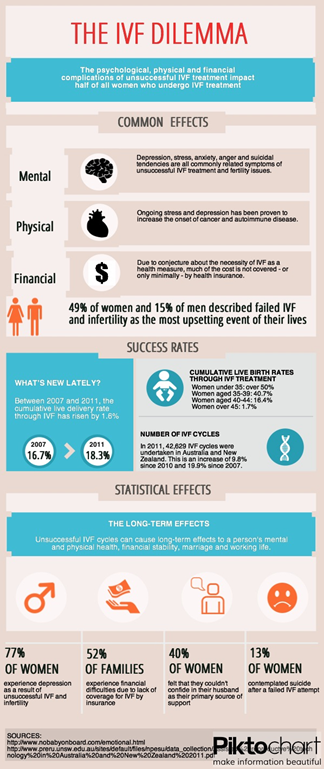IVF: The side no one sees
As many women turn to IVF as their final option, psychiatrists and past patients have warned of the potentially devastating effects of unsuccessful IVF treatment.
Two years on from her decision to discontinue treatment, Annette Evans, 43, is still battling with the physical, financial and emotional effects of failed IVF cycles.
“I started to doubt my worth as a person and ask what my purpose in life was… I began to think of myself as less of a woman, less of a person, and as a useless waste of space.”
Through the course of five years, six failed IVF cycles and $20,000 of accumulated IVF bills, Ms Evans’ physical and mental health began to deteriorate.
“Miscarriages and ectopic pregnancies requiring surgical intervention is the start, as a result of stress – mental, physical and emotional – I have now also been diagnosed with an autoimmune condition called Graves Disease.”
Dr Georgiana Antoce, psychiatrist and senior lecturer at the University of Queensland, says that the grief caused by unsuccessful IVF cycles can increase the onset of cancer and autoimmune disease.
“For the woman in particular I think it can lead to a disaster; depression, anxiety, guilt, sometimes suicidal thoughts and tendencies, anger that is not able to be verbalised, a lot of questions about ‘who am I?’ and ‘what does this mean about me?’
“I am a strong believer of an integrated approach in medical care, so inevitably, prolonged emotional stress and depressive cognitions will affect physical health… this is called psychoneuroimmunology.”
Dr Antoce stresses the need of counseling services for both men and women in order to maintain mental health and marital stability throughout the treatment.
“It can lead to marriage break-ups, so members of the couple need a lot of support and encouragement to verbalise their feelings…”
“I wouldn’t say it’s easy to bounce back; I don’t even know what bouncing back means in that situation because they are changed forever by the process, so they will have to reinvent themselves and their relationship.”
Dr Tony and Terressa Elliott, 43 and 44, who underwent two years of IVF treatment before eventually conceiving naturally, agree that counseling services should be equally accessible to men.
“They aren’t geared towards the male side of it,” Dr Elliot says. “In their view it’s the women who are going through it, injecting themselves, dealing with the emotional side effects, and the men are just there to drive them around.”
A study by Organon found that 77 per cent of women with ongoing fertility issues have experienced depression, while 49 per cent of women and 15 per cent of men described the inability to conceive as the most upsetting experience of their life.
Ms Elliott advocates the necessity of IVF as a means to conceive, but suggests an informed approach.
“You’ve got to go into it with the attitude that this is going to work and I’m going to give it everything I’ve got, but while acknowledging that it may not. I think that’s the only way to get through it but, to be honest, it’s impossible to maintain.”
IVF Beth Mitchell, 17, was an IVF baby and is grateful for her parent’s perseverance after several unsuccessful attempts.
“It feels like I’m the miracle they didn’t think they would ever have, especially after the failed IVF previously… my mum donated the rest of her eggs to women who hadn’t produced enough or suitable ones because she knew how heartbreaking it is to be disappointed like that.”
A recent study conducted by the National Perinatal Epidemiology and Statistics Unit found that only 16.4 per cent of Australian women aged 40 to 44 who underwent IVF treatment achieved a live birth; for women aged over 45, the odds plummeted to 1.7 per cent.
Given the implications of these statistics, Dr Antoce suggests that a revaluation of societal norms and the pressure on women to have children is necessary.
“I think we really need to open a discussion at a social level because a lot of women are affected and a lot of men are affected; the whole culture is geared towards having babies, and IVF as a cure.”
Despite her history, Ms Evans maintains: “I would recommend to anyone struggling to conceive to look into IVF as an option… but people need to be aware that it’s not a cure all, it’s not successful even fifty percent of the time.”
“[When it’s not successful], you’re forced to find a different reason for your life, your relationship, a different reason for doing and being… Everything happens for a reason, and going through this experience has changed me irrevocably.”
If you or someone you know is struggling with the grief of unsuccessful IVF or infertility, please seek help. Call Beyond Blue on 1300-22-4636 or visit www.beyondblue.org.au

